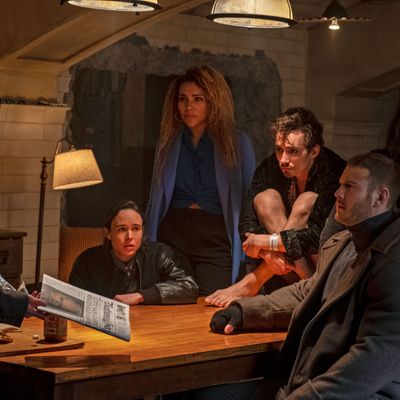
Apologies to TV creators who prefer that their work be viewed in totality before issuing a verdict, but life is short, and there’s only so much tomfoolery a viewer can take. I bailed on Netflix’s Umbrella Academy — or maybe I should say closed it? — near the end of the third hour, for what is admittedly an arbitrary and film-nerdy reason: It took Nina Simone’s “Sinnerman” — a classic that already feels like an epic movie packed into a few fleet minutes, and that has been used with originality and daring in films by at least three great directors (David Lynch’s Inland Empire, Michael Mann’s Miami Vice, and John McTiernan’s remake of The Thomas Crown Affair) — and dropped it into an unremarkable superhero punch-out filled with clichéd speed-shifting and wire stunts. Why? I suppose to make it seem as if the sequence had personality.
Umbrella Academy does this kind of thing constantly, to the point where it starts to feel blandly oppressive.
Based on the Eisner Award–winning comic books by Gerard Way and Gabriel Bá, and overseen by showrunner Steve Blackman (a writer on season two of FX’s Fargo) and his writing and directing team, the series tells the story of a group of special individuals who were all born at the same moment around the world, then raised as a family in an X-Men–type mansion/school/makeshift family home and taught to battle crime. In the flashbacks, they come off as something akin to the Harry Potter wizards-in-training, by way of Wes Anderson’s Tenenbaum family.
In the present day, the adult versions of the characters mope around the mansion where they were raised as human science experiments by a cold and manipulative billionaire dad, Sir Reginald Hargreeves (Colm Feore), and the robot mom he programmed to raise them (Jordan Claire Robbins). Much of the show’s running time is devoted to chronicling their mixed feelings about the old man’s recent death, and debating whether mom might’ve finally had enough of his B.S. and killed him, all while evading regular assassination attempts by a couple of killers (played by Mary J. Blige and Cameron Britton) who wear oversize carnival-animal heads as masks (nobody in movies or TV shows ever just wears a plain ski mask to do bad stuff). The siblings include violinist Vanya (Ellen Page), the only family member without superpowers; Klaus (Robert Sheehan), a telekinetic drug addict who can talk to the dead; Luther (Tom Hopper), a former astronaut with a torso and shoulders and arms so absurdly oversized that he looks like he’s wearing David Byrne’s Stop Making Sense jacket; Alison (Emmy Raver-Lampman), a movie star who can warp the fabric of reality by lying; Diego (David Castañeda), a black-leather-wearing rebel type and expert knife-thrower who frequently comes to blows with Luther; and Number Five (Aidan Gallagher). The latter character is the standout, thanks to the petulant wisdom that radiates from Gallagher’s performance. He has special, horrible knowledge that makes him feel like the worst kind of “chosen one” protagonist: He can travel through time and space, and has recently returned from a future apocalypse (just eight days in the future, seemingly) whose origins are a mystery.
I haven’t read the source material, which I can only assume was thrilling and special enough to inspire a production this lavish. But I have seen movies by filmmakers that pretty clearly informed the show’s aesthetic — Terry Gilliam, Wes Anderson, Zack Snyder, and a few other tic suppliers — and after a while, you start to realize that there’s not much else going on here, beyond some admirable if too strenuous attempts by the actors to breathe life into the show. It is packed with talent, but except for Gallagher’s time-traveling Max Fischer vibe, somehow none of it quite shines as it has every right to — save for the mid-20th-century-inflected production design and art direction (credited to a team of four), and Jeff Russo’s old-fashioned score, which strives to impart melancholy soulfulness and oddball energy to scenes of poker-faced characters accusing each other of bad stuff.
Ellen Page in particular seems especially deflated by the production. She’s one of the most original screen actresses to come along in the past decade and a half, though the material she’s given rarely plays to her strengths. She putters around in the margins of the story looking bummed, only showing flickers of charisma in scenes opposite John Magaro, who plays a young antique-shop manager and sculptor who’s sweet on her character. It gets exhausting trying to find something in this series, be it an action beat or a character moment, that doesn’t seem appropriated and superimposed over standard grim-dark quirkiness — something, anything, that feels truly original, organic, and personal, rather than the filmmaking equivalent of a dull person realizing one day that they would prefer to be known as an eccentric, then running out and buying a hat identical to one that they saw a pop star wearing at the Grammys. If I had the superpower to skip forward in time and find out how I felt about this series without having to trudge through the rest of it, I would — but we’re only given one life.
Want to know what’s new on Netflix? Check out Vulture’s streaming guide.


